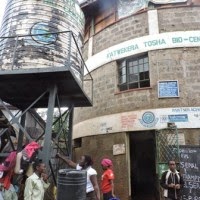HRBA Meeting Narrative At Mukuru Kwa Njenga
Mukuru Kwa Njenga is a slum in
the East of Nairobi, the capital of Kenya belonging to Embakasi constituency.
Under the guidance of Umande trust, the community members have come together as
one to identify their problems and seek solutions to them. Attending one of the
scheduled meetings, I was able to learn so much about this community.
As the Kenyan flag symbolizes
Unity for our country, so does the slogan “muungano!” for the community
representatives from Mukuru Kwa Njenga ward.
The Slogan is a Swahili word meaning union. Their unification is
demonstrated by the vehemence the members had as they stood up to introduce
themselves: They began by strongly stating the slogan, then their names, where
they come from and what they love and hate with regard to making Mukuru a
better place.
“I love peace, transparency,
security and water and abhor deceit, favoritism and hate,” says one of the
community members. She summarizes the major challenges they face from day to day.
Based on the meeting, what I realized was that Mukuru faces a major hurdle,
water.
They face all the problems
related to water, from its cleanliness; some of the members do not access clean
water therefore they are sometimes forced to drink water from the sewage, availability;
water is accessible only to people living in the flats and some of the
villagers, affordability; the prices of water are high making it hard for
people to buy the water and seek alternative sources(salty water), accessibility;
the people find it hard to acquire water
without harassment, quality; treated, clean water is scarce, security; the
piped water sometimes is diverted before it reaches the original beneficiary
and there is inadequate electricity to pump the water.
To stabilize this, firstly, they went out for
mapping to establish water areas where new metres could be installed.Secondly,
to get a permanent office from Nairobi Water Company so that the community
members and landlords could have a designated area for getting water metres and
legal connection. Revive the dormant water kiosks which are sometimes used for
illegal business and to investigate on who was given the responsibility of
managing them.
The representatives acknowledged
not only having challenges but also achievements. They are happy that the World
Bank and other non governmental organizations have come in handy to ensure
water availability even though it may not be sufficient and constructing some
of the water kiosks where some are finished others are under construction.
Accepting that charity begins at home, they deem it fit to solve the problems
at home first.
They desire to know their rights
so that next time they can say ‘’NO!’’ to exploitation and discrimination to
water services and disposal of garbage. This responsibility was passed on to
the enlightened members, the leaders. Community members who know these rights
were reported to have been ignorant to helping out if not directly affected, a
behavior that must be clogged.
As we departed one of the members
says, “Foundation is what matters. As the rights holders fighting for our
rights starts with us.” We all agreed and ended on that high positive note as
everyone left for their home.
Written by Jill Apiyo.
Written by Jill Apiyo.



I thank you so much for the recommendation and to the negative side of it is that the water problems that you have highlighted above are still experienced till now. Please carry out a follow up.Thank you
ReplyDeletePlease preview me for any questions since I am a resident there
Delete